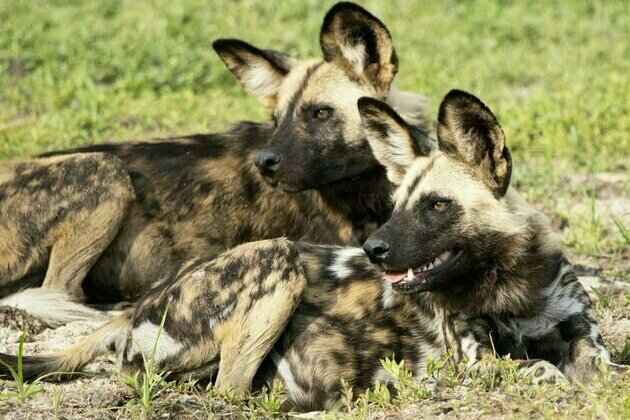African wild dogs: DNA tests of their faeces reveal surprises about what they eat
The Conversation
04 May 2025, 07:09 GMT+10

The African wild dog is one of Africa's most endangered predators. African wild dogs are highly elusive, avoiding human contact and utilising vast, remote territories to remain out of sight. Current estimates suggest that only about 6,600 individuals remain, in fragmented populations across southern and eastern Africa. About 600 live in South Africa.
Some of the populations in South Africa are closely monitored and managed. A better understanding of their diet and feeding behaviour would benefit conservation efforts. For an endangered species, every bite counts.
Analysing the dogs' diet can improve our understanding of the dynamics that exist between wild dogs and their prey species. It also tells us what wild dog packs might eat in the future if their usual prey no longer exists in large numbers. And it shows which species contribute most significantly to the wild dog diet.
We are a group of scientists dedicated to research and teaching relating to the biology and ecology of African mammals. We also research how indigenous mammal fauna can be conserved in the context of sustainable human development.
We collected samples of wild dogs' faeces from across seven different landscape types in South Africa's Kruger National Park, extracted DNA from them, and analysed this.
Our research found that, as expected, African wild dogs eat mostly impala (antelopes) and other medium sized hoofed animals. However, the DNA metabarcoding also revealed seven other types of animals that wild dogs eat, including the Cape hare. We didn't know before that wild dogs eat these animals.
This demonstrates that DNA metabarcoding (identifying DNA by comparing it with what's already known) can uncover new information about wild dog diets that we can use to better conserve this endangered carnivore.
DNA is the molecule that carries the instructions for life. Think of it as nature's biological blueprint. It's made of two twisting strands (the "double helix") and contains four chemical "letters" (A, T, C, G) that code (serve as instructions) for everything from eye colour to how your body functions. Every living organism, from humans to plants to African wild dogs, has unique DNA that determines its traits.
We used a bioinformatics pipeline to analyse the DNA results. A bioinformatics pipeline is a step-by-step automated process that collects the raw data (like a scanner reading DNA sequences). It then cleans it up (removing errors, like filtering out low quality sequences) and puts the sequences together (matching DNA fragments to known species or genes).
Read more: How DNA evidence could be a game-changer in monitoring freshwater fish
We successfully analysed and matched our DNA samples to DNA sequences in a library of possible prey species from GenBank, a giant, free online library for DNA that stores the genetic sequences of known species. It is like a Google search, but for DNA. You upload a mystery sequence, and GenBank helps "match" it to a known sequence.
This was the first time that DNA metabarcoding had been used to analyse the diet of African wild dogs. Previously, faeces (also known as scat) were analysed in a laboratory. But now, technological advancements like DNA metabarcoding are more available and affordable. And DNA metabarcoding provides much more precise results.
Without a database, identifying species from environmental DNA would be nearly impossible. The technology has only recently been developed and applied in wild populations.
We found for the first time that wild dogs also eat smaller species, such as two francolin bird species, the Cape hare and the vlei rat. This indicates that the wild dogs don't always hunt in packs. Instead, individual pack members may be hunting a variety of small prey species alone to supplement larger meals obtained through pack-hunts.
This insight may challenge the prevailing view of African wild dogs as animals that choose to hunt in packs for the most nutritious and easiest-to-catch prey available. This finding helps scientists to predict behaviour.
We also found the DNA of hyenas and elephants in the samples. However, we ruled out these animals being prey and instead believe their DNA may have been detected in the samples due to their shared habitats and closeness. Wild dogs have also been seen eating elephant dung.
This was also an important finding because it shows that wild dogs can be adaptable and flexible in what they eat. It could also be that the wild dogs sniffed out dung beetles in the elephant's faeces, and ate these for protein.
Metabarcoding is a powerful tool for wildlife researchers. For conservationists, these insights can guide wildlife management strategies that will ensure there is always enough in the wild dogs' habitat for them to eat.
We aim to open the door for further research into the wild dog diet and to highlight the benefit of DNA metabarcoding. Currently, we are studying faeces from wild dogs in the Waterberg, Limpopo province in South Africa, to expand this pioneering study.
We hope that future studies, with larger sample sizes and expanded genomic databases, will provide more detail about the dietary habits of other elusive carnivores.
DNA metabarcoding doesn't just satisfy our scientific curiosity; it equips us with the knowledge to protect their survival in a changing world.
(Master's student Bridget O'Connor co-authored the research that this article is based on. It formed part of her honours degree within the Department of Zoology and Entomology of the University of Pretoria. The bioinformatics pipeline was created with the assistance of Clarity, a bioinformatics service and an initiative of DIPLOMICS, supported by the South African Department of Science, Technology and Innovation.)
 Share
Share
 Tweet
Tweet
 Share
Share
 Flip
Flip
 Email
Email
Watch latest videos
Subscribe and Follow
Get a daily dose of Kenya Star news through our daily email, its complimentary and keeps you fully up to date with world and business news as well.
News RELEASES
Publish news of your business, community or sports group, personnel appointments, major event and more by submitting a news release to Kenya Star.
More InformationAfrica
SectionIndia, Angola share collective interest in UN reform: MEA Secy Dammu Ravi
New Delhi [India], May 4 (ANI): India and Angola underscored the urgent need for reforming the United Nations (UN) to reflect contemporary...
India focuses on its strengths in Africa, not competition with China: MEA
New Delhi [India], May 4 (ANI): India is committed to deepening its engagement with Africa by leveraging its own strengths, rather...
Gate of Sudan Festival cultural platform for UAE-Sudan exchange
Dubai [UAE], May 4 (ANI/WAM): Amin Gafar, Head of Sudanese Diaspora in the UAE, affirmed that the Gate of Sudan Festival, held today...
Reform or retreat? The Catholic church in Africa after Pope Francis
The Catholic church faces a fundamental question as it prepares to elect a new pope. That is, whether to go back to a monarchical papacy...
African wild dogs: DNA tests of their faeces reveal surprises about what they eat
The African wild dog is one of Africa's most endangered predators. African wild dogs are highly elusive, avoiding human contact and...
"Angolan President specifically asked for India's support in healthcare": MEA
New Delhi [India], May 4 (ANI): Ministry of External Affairs said that Angolan President Joao Manuel Goncalves Lourenco 'specifically'...
World
SectionGM recalls 720,000 vehicles over V8 engine defect
WASHINGTON, D.C.: General Motors is recalling more than 720,000 vehicles globally over a defect linked to its 6.2L V8 engines, the...
France and Costa Rica Co-Host Crucial UN Ocean Summit Amid Rising Threats
From June 9–13, 2025, France and Costa Rica will co-host the Third United Nations Ocean Conference (UNOC3) in Nice, bringing together...
Israeli airport hit by Houthi missile: Live Updates
The IDF has confirmed that it failed to intercept a projectile that landed in Ben Gurion near Tel Aviv Israel's main airport was...
US plans to end International Space Station before 2030
A federal road map calls for reduced staffing and an expanded role for private companies in space operations The US government has...
"Trade and terrorism cannot work together": BJP's RP Singh praises India's decision to ban all Pakistan imports
New Delhi [India], May 4 (ANI): BJP National Spokesperson RP Singh on Sunday welcomed India's decision to ban all direct and indirect...
India suspends Bilawal Bhutto Zardari, Imran Khan's X accounts amid rising tensions with Pakistan
New Delhi [India], May 4 (ANI): Following heightened tensions between India and Pakistan over a deadly terrorist attack in Pahalgam,...












